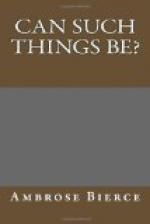“One morning as we skirted a mountain range, seeking a practicable pass, we were attacked by a band of Apaches who had followed our trail up a gulch—it is not far from here. Knowing that they outnumbered us ten to one, they took none of their usual cowardly precautions, but dashed upon us at a gallop, firing and yelling. Fighting was out of the question: we urged our feeble animals up the gulch as far as there was footing for a hoof, then threw ourselves out of our saddles and took to the chaparral on one of the slopes, abandoning our entire outfit to the enemy. But we retained our rifles, every man—Ramon Gallegos, William Shaw, George W. Kent and Berry Davis.”
“Same old crowd,” said the humorist of our party. He was an Eastern man, unfamiliar with the decent observances of social intercourse. A gesture of disapproval from our leader silenced him and the stranger proceeded with his tale:
“The savages dismounted also, and some of them ran up the gulch beyond the point at which we had left it, cutting off further retreat in that direction and forcing us on up the side. Unfortunately the chaparral extended only a short distance up the slope, and as we came into the open ground above we took the fire of a dozen rifles; but Apaches shoot badly when in a hurry, and God so willed it that none of us fell. Twenty yards up the slope, beyond the edge of the brush, were vertical cliffs, in which, directly in front of us, was a narrow opening. Into that we ran, finding ourselves in a cavern about as large as an ordinary room in a house. Here for a time we were safe: a single man with a repeating rifle could defend the entrance against all the Apaches in the land. But against hunger and thirst we had no defense. Courage we still had, but hope was a memory.
“Not one of those Indians did we afterward see, but by the smoke and glare of their fires in the gulch we knew that by day and by night they watched with ready rifles in the edge of the bush—knew that if we made a sortie not a man of us would live to take three steps into the open. For three days, watching in turn, we held out before our suffering became insupportable. Then—it was the morning of the fourth day—Ramon Gallegos said:
“’Senores, I know not well of the good God and what please him. I have live without religion, and I am not acquaint with that of you. Pardon, senores, if I shock you, but for me the time is come to beat the game of the Apache.’
“He knelt upon the rock floor of the cave and pressed his pistol against his temple. ‘Madre de Dios,’ he said, ’comes now the soul of Ramon Gallegos.’
“And so he left us—William Shaw, George W. Kent and Berry Davis.
“I was the leader: it was for me to speak.
“‘He was a brave man,’ I said—’he knew when to die, and how. It is foolish to go mad from thirst and fall by Apache bullets, or be skinned alive—it is in bad taste. Let us join Ramon Gallegos.’




